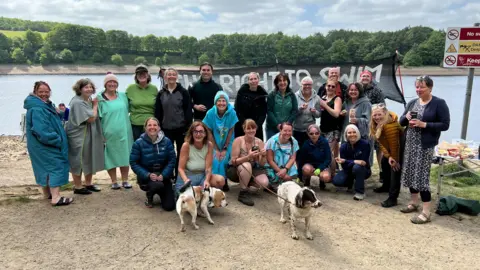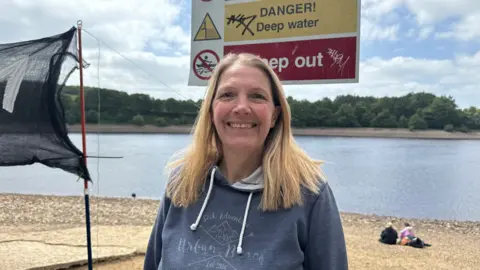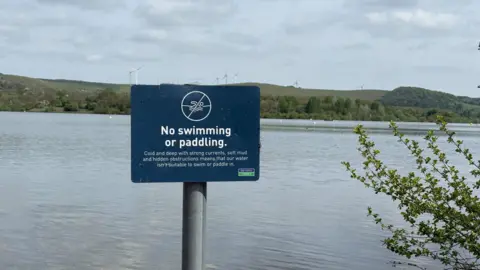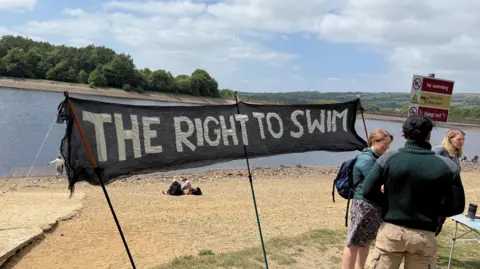'We want to swim in reservoirs in England and Wales'
 BBC
BBCThe right to swim in inland water in Scotland is clear, so why is it not the same for England and Wales?
Swimmers are arguing for the right to access waters owned by utility companies at their own risk.
But the water companies that own these reservoirs say swimming in a body of water like this could be extremely dangerous.
Recently, swimmers have staged protests at Kinder Reservoir, near Whaley Bridge, and Staunton Harold, near Melbourne, taking inspiration from the mass walking trespass at Kinder Scout in Derbyshire in 1932.
The original protest opened up the "right to roam" movement in the UK, and paved the way for the creation of what we now know as the Peak District National Park.
So could this new movement of protest swimming bring in legislation similar to Scotland?

Speaking to the BBC at Bottoms Reservoir in Glossop, Derbyshire, open water swimmers explained why access was so important to them.
Liz Collier, 51, from Glossop, said: "It's a community resource, and it really should be that.
"With the current cost of living crisis as well, we know that people's mental health and physical health is suffering, and right on our doorstep we've got something free that should be available to everybody.
"When you've got the bird swooping overhead and you can hear the water and the oystercatchers, it's something really special and everybody should be able to enjoy it.
"When the reservoirs have been really low, we've done surveys. The idea of having mincing machinery at the bottom of the reservoirs isn't true.
"There's certainly areas of danger like dams, but generally they're much safer than swimming in the sea.
"It would be much better if people had a good understanding of water safety."

Swimmers suggest more education on entering cold water safely, rather than preventing people altogether, would reduce the risk of people getting into difficulty in these waters.
Clare Taylor, 45, from Glossop, said: "There's lots of young adults drowning in these reservoirs because there's not enough support to understand how to swim safely.
"In other countries, they have jetties and areas where you can swim safely for free."
Valerie Middlecroft, 47, also from Glossop, added: "Over the years, it's had such a positive impact on my mental health and ability to cope with different stresses in life. It's such a supportive community as well."
The Land Reform (Scotland) Act 2003 creates a right of responsible access to land and water in Scotland, including access to reservoirs for water based activities.
Although the protests are aimed at swimming in reservoirs, the Right to Roam protest is for the default right to have responsible access to land and water.
The swimmers argue they already have public access to reservoirs in England and Wales, which are typically owned by water companies like Severn Trent Water and United Utilities.
Water and wasteland services in England and Wales were privatised in 1989, leading to legislation that gave the public the right to access the land and water for recreational use.
However, if you make a trip to any reservoir, there is a sure probability you'll be faced with "no swimming" signs.

Howard Perry, a network operations manager at Severn Trent, says this is because of unseen dangers in these waters.
"They're not designed for swimming, they're designed to hold a huge amount of water," he said.
"It means they're very deep, steep-sided and can be extremely cold.
"There's currents and things going on under the water that can really cause problems for people.
"We have some terrible tragedies that we hear about every year when people have gone into the water and got into difficulty and drowned.
"That's absolutely what we want to avoid."
Could the law change?
One person who swam at the Kinder Reservoir trespass in April 2025 was Phil Brickell, MP for Bolton West, who wants to see England adapt the same approach as Scotland.
He told the BBC he was "a massive outdoor pursuits enthusiast".
Brickell said: "There's very limited access to the countryside across England and Wales in particular.
"Only about 4% of inland waterways, rivers, lakes, streams have got any legally recognised right of access.
"Fewer than 8% of all of the countryside has a right of access for people to enjoy those green spaces.
"We've got a real inequality in how people can access the environment.
"Legislation is Scotland has allowed for more than 20 years now a responsible right of access to the countryside that has worked really well. Elsewhere in the UK that hasn't been the case.
"We are a real outlier compared to our European neighbours, and that's really important because we know the immense physical and mental health benefits that can come from access to nature."

Brickell said he thought water companies "have a responsibility to open up their land for responsible use" and added he was "pushing the government to be as ambitious as it can be".
"I think the Scottish model is a good one to look in terms of how well embedded it is, but it also creates that clarity of access," he said.
"I'm continuing to work with other MPs in parliament on this issue, and we'll be pushing the Environment Secretary and the ministerial team to be bold and ambitious ahead of a possible consultation later this year on what good access might look like across England and Wales, and what lessons can be learnt from Scotland."
Labour said in 2023 that it wanted to extend the current provision - but stepped back from that commitment, after farmers raised concerns.
The Department for Environment, Food and Rural Affairs refused to comment on whether England and Wales could get Scottish-style legislation on inland water access.
It seems protests like the trespass at Kinder Reservoir and Staunton Harold are all swimmers can currently do to push for this campaign.
Follow BBC Derby on Facebook, on X, or on Instagram. Send your story ideas to [email protected] or via WhatsApp on 0808 100 2210.
